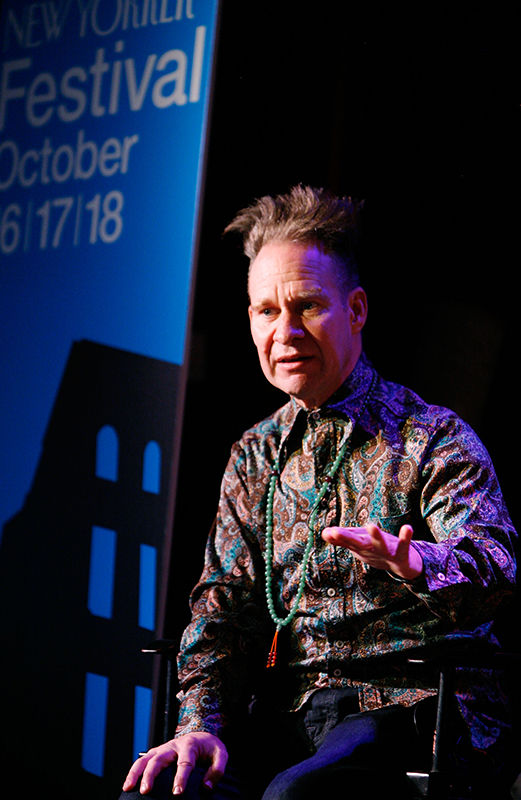For two performances only — on Oct. 29 and 30 — Peter Sellars will direct the L.A. Master Chorale in “Lagrime di San Pietro” (The Tears of St. Peter), an a cappella Renaissance masterpiece by composer Orlando di Lasso.
Sellars, as you may know, is the internationally-acclaimed theater and opera director who shot out of Harvard in the late 1970s to do ground-breaking productions of Shakespeare, Gogol and Mozart, and who hasn’t stopped since. When he’s not traveling, he makes his home in Culver City and is a professor of world arts and cultures at UCLA, where he teaches art as social action and art as moral action.
Last week he was kind enough to share his enthusiasm and excitement about “The Tears of St. Peter.”
“One of the things that’s most overwhelming about the piece is that at the 11th hour the person who’s had the most courage and insight and who truly understood in such deep ways who Jesus was and what he was asking fails to come through.”
“Upon this rock I will build my church,” Christ tells Peter.
“Then the guy who gets it suddenly panics. The guy who had extra courage, extra insight, now can’t speak up. Can’t find himself, can’t find his best friend, can’t find a way forward. He’s not the rock after all. Or more to the point, this is crisis even if you are the rock!”
That could happen to any of us. That has happened to most of us.
“Even the most powerful insightful, courageous people, at a certain moment, the cops are present and they — we — can buckle.
“You change your belief system in a sports bar. Everything gets reduced to the score of the last game. You forget that the whole gift of your team is that it’s losing! It’s more blessed to lose than to win. But in a sports bar, you want to be in the winner’s circle.
“That’s why there’s injustice in the world. We all know there’s a lot that should not be happening. But we’re scared. We’re intimidated. So we tend to retreat and withdraw and disappear instead of stepping forward and speaking up.
“The rest of the world sees Jesus as a criminal who needs to be executed. And we fail to step forth and declare what we know in our hearts to be true.
“Jesus’s gift was to hang out with criminals and to see God’s most highly inspired creation in the criminals. Jesus saw the lowest of the low are actually going to be the greatest citizens, ever, exactly because they know what it’s like to hit bottom. They will spend the rest of their lives never going to that bottom again. And they will have compassion.
“Those are the saints.”
As for the composition itself, “This piece is in our lives only because we know [long-time LA Master Chorale conductor] Grant Gershon. I did not know this piece at all. Grant said, ‘Peter, you have to work on this.’ I took a look at it and said, ‘Are you kidding? The musical density is beyond belief. This is impossible. This will take years.’”
Sellars took on the job anyway.
“This is a piece about the power of tears. It’s relentless in its swirl of shame and negativity. Peter founded the Catholic church, for heaven’s sake! But every single night of his life he cries those tears.
“There are different types of tears. There are the tears of self-pity. Self-pity is a really bad idea in art and in life. I won’t have it on stage. It’s refusing to take responsibility for our own lives. It’s blaming everyone else and saying, ‘I don’t want to live any more.’ God says, ‘That’s a little too easy.’”
If our remorse is authentic, the next tears are the tears of repentance.
“Tears of repentance are finally about other people, not about you. Exactly because of what you’ve gone through and how deep your shame is, you’re now called to live with your hard-won insight, courage, and humility.”
Peter moves from the tears of ego crisis to the tears that wash, cleanse and transform.
“This is a piece that takes someone to the other side of suicide.”
This was Orlando’s last composition. He died on June 14, 1594, two weeks after completing the score.
“The Renaissance is about understanding that the human being is God’s most complex creation. Polyphony of this kind of depth and detail is totally sculptural. The genius of the piece is that in this zone of harmonic darkness, there’s always light shining. You can only find that inner radiance in the great masters. ‘If I go to hell, God is also there.’ This idea that nothing is out of reach of God.”
The piece consists of 21 madrigals sung by 21 singers. “All about one moment in Peter’s life. Twenty-one songs, about five minutes each, of ‘I should have said something.’”
The Master Chorale did several weeks of work before Sellars came on board. Now they’re spending this month of October together.
But the preparation began way before that. “Each of those singers is bringing to the piece the experience and heart of a lifetime.”
Heather King is a blogger, speaker and the author of several books.

